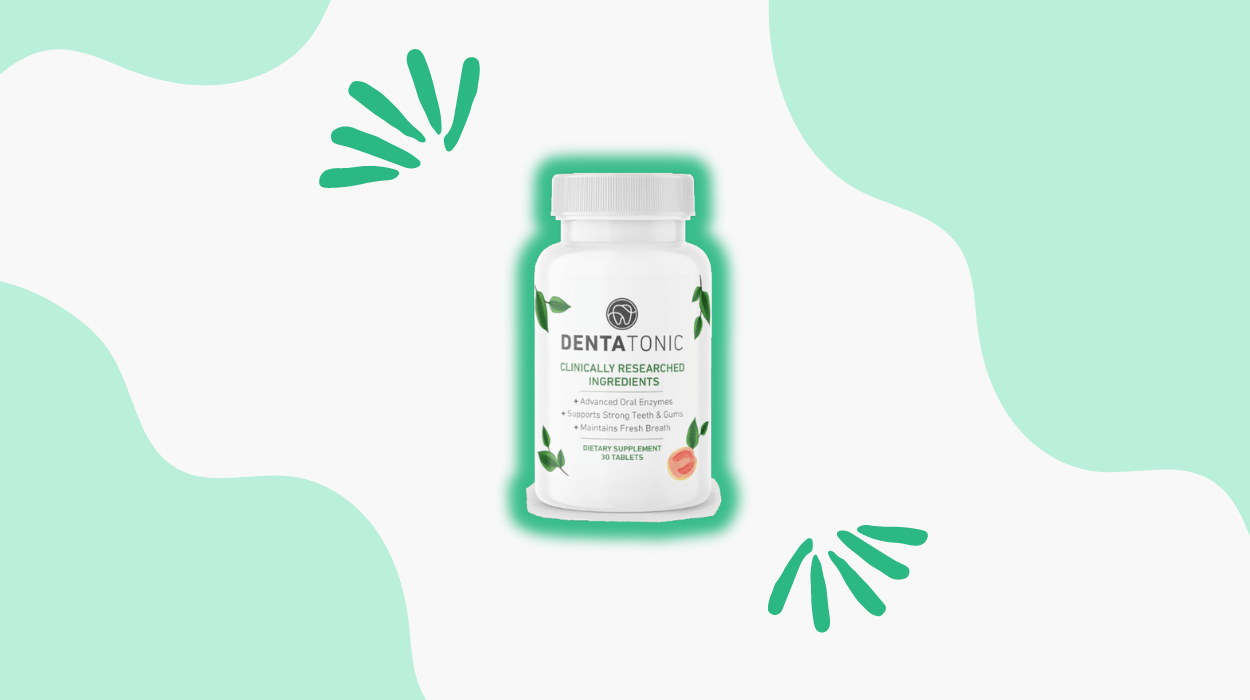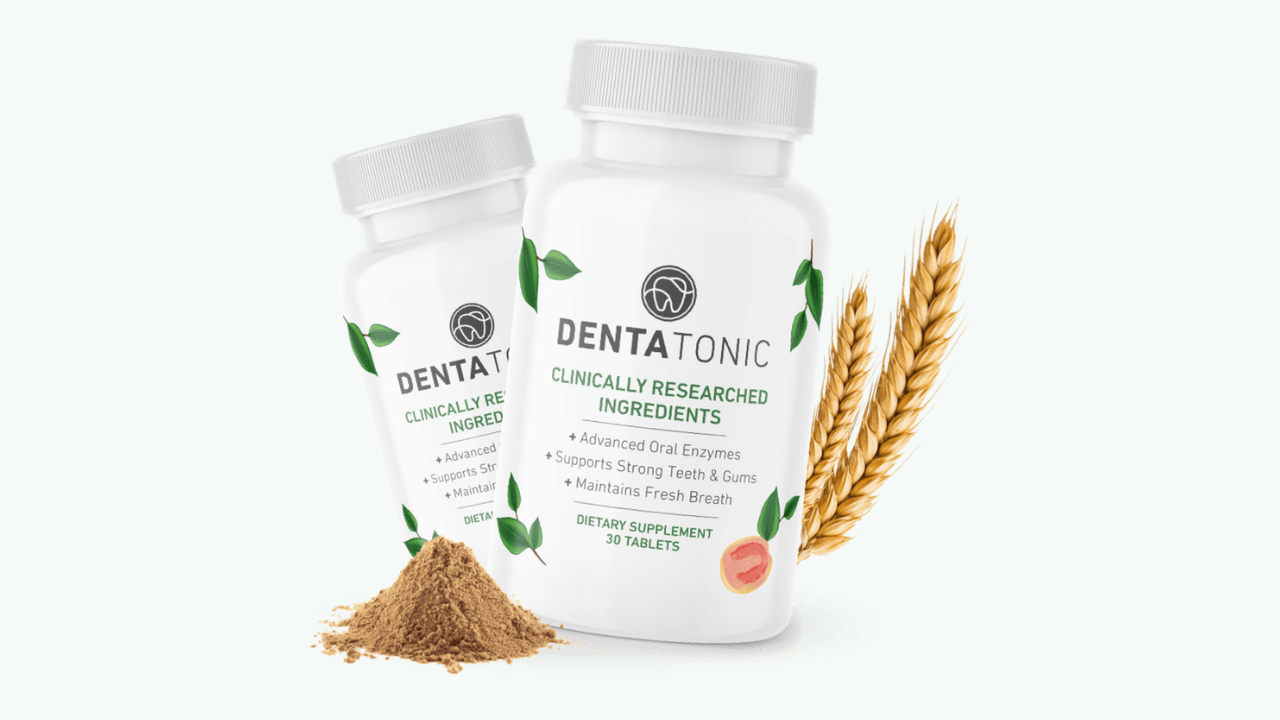

DentaTonic claims to restore oral enzymes, helping protect your teeth and gums against oral bacteria that may cause dental issues.
Consuming sugary or citric foods and poor oral hygiene may lead to dental health concerns, such as cavities, toothache, chipped teeth, gum irritation, and more.
DentaTonic promises to prevent plaque formation on the enamel and reduce bad breath. Can DentaTonic also strengthen teeth and gums?
This exclusive DentaTonic review shall analyze its effectiveness in supporting oral health. It will also explore DentaTonic’s working mechanism, usage guidelines, benefits, potential drawbacks, and more.
According to the official website, DentaTonic may support teeth and gum health. It contains proteins and salivary enzymes that may prevent bacterial buildup, promote a fresher breath, and minimize cavities.
DentaTonic aims to mitigate the effects of harmful substances like hydrogen cyanide on the tooth enamel, which may cause bleeding gums, tooth decay, and osteonecrosis.
The manufacturers claim that DentaTonic could enhance the defensive capabilities of the saliva against harmful oral bacteria and plaque. It might help minimize the risk of dental issues, such as dental caries, gum disease, or periodontal disease.

According to the official site, DentaTonic could reinforce lactoperoxidase levels in saliva. This antimicrobial enzyme acts as a defense mechanism against harmful bacteria that may lead to dental issues.
It contains advanced oral enzymes that may negate the harmful effects of plaque and hydrogen cyanide, creating a safer dental environment. These virtues may help shield the teeth and gums from potential damage.
The ingredients in Dentatonic, such as dextranase, lysozyme, and lactoferrin, exhibit antibacterial properties and contribute to maintaining oral hygiene. They might reduce the risk of dental caries, minimize the risk of oral infections, and protect the enamel.
Microcrystalline Hydroxyapatite in DentaTonic could help remineralize and strengthen tooth enamel, reduce the risk of cavity formation, and strengthen the tooth structure.
Amylase (a digestive enzyme) in DentaTonic may help break down sugar molecules and prevent them from sticking to the teeth. These effects could reduce the likelihood of developing dental issues like cavities, caries, or gum-related issues.
Lysozyme possesses antibacterial properties that may break down bacterial cell walls, disrupting their ability to thrive and reducing the risk of oral infections. It could regulate the oral microbiota, preventing the overgrowth of harmful bacteria that may contribute to dental problems. Lysozyme could inhibit bacterial growth in the oral cavity and thus help prevent the formation of dental plaque. It may enhance the body’s immune response by curbing the growth of harmful microorganisms like bacteria, fungi, and viruses. Such a mechanism may strengthen oral immunity by improving the immune response against oral infections.
Lactoferrin may help maintain iron levels in the body by binding to iron molecules and providing its transport. Such effects may prevent oral concerns caused by iron deficiency, such as sensitive teeth and gums or dry mouth.
It possesses antimicrobial properties that may inhibit the growth of oral pathogens, including bacteria, viruses, and fungi. It could prevent their adhesion to tooth surfaces, which might help prevent plaque formation, cavities, and gum disease.
Lactoferrin has anti-inflammatory effects, which could reduce inflammation in oral tissues and gums. These properties may support healthy oral tissues and reduce the risk of conditions like gingivitis.
Lactoperoxidase is a natural salivary enzyme that acts as a potent antimicrobial agent. It helps inhibit bacterial growth in the oral cavity, inhibiting their ability to cause tooth decay, gum disease, and bad breath.
The antimicrobial properties of lactoperoxidase may help produce reactive oxygen species, such as hypochlorous acid. These reactive oxygen species could kill bacterial overgrowth by damaging cell membranes and proteins.
Lactoperoxidase could help remineralize the enamel by increasing the deposition of phosphate and calcium ions. These effects aid in maintaining the structural integrity of the teeth and might reverse the early stages of tooth decay, preventing further damage.
Besides antimicrobial properties, lactoperoxidase also has anti-inflammatory effects. It may help reduce inflammation in the gums, prevent the progression of gum disease, and strengthen oral tissue health.
Dextranase may work by breaking down dextran, a polysaccharide that forms the sticky matrix of dental plaque. Degrading dextran may disrupt plaque structure, making it less adhesive and easier to remove through regular brushing and flossing. These effects could aid in preventing the erosion of tooth enamel, which helps reduce the risk of cavities.
Beta-glucanase (an essential enzyme) may activate the production of immune-boosting cells and macrophages. It might target the elimination of beta-glucan compounds in the bacterial cell walls.
These properties may enhance oral immunity against bacterial, viral, or fungal pathogens and help reduce the severity of plaque infestation on the teeth. Such effects may improve overall oral health and hygiene.
Amylase (an enzyme found in pancreatic fluid and saliva) may promote oral health by aiding digestion and absorption of complex carbohydrates into simple sugar molecules. It helps whiten the teeth by breaking down food particles and stains that may be present on the surface of the enamel.
Amylase may inhibit plaque buildup on the enamel, helping prevent dental issues like gum disease and tooth decay. It could potentially prevent dental caries (cavities) by breaking down sugars and preventing them from sticking to the teeth.
Microcrystalline Hydroxyapatite is a form of calcium phosphate closely resembling the mineral composition of the teeth and bones. It could remineralize and strengthen the tooth enamel by providing vital minerals for maintaining healthy teeth and gums. Microcrystalline Hydroxyapatite could support the natural repair process of cavities by providing the necessary minerals.
DentaTonic contains advanced oral enzymes that may alleviate tooth sensitivity by strengthening the teeth and reducing sensitivity to external stimuli. It could restore oral health by combating bacterial and plaque infestation, helping minimize tooth sensitivity.
You could enjoy your favorite foods and drinks (whether hot or cold) without worrying about toothaches or bleeding gums after taking DentaTonic.
DentaTonic has antimicrobial properties that might combat bacteria and protect the teeth and gums from decay and infection. It could boost the saliva’s defensive capabilities against harmful bacteria and reduce plaque buildup, potentially preventing tooth decay.
Curbing the chances of tooth decay in its early stages may help avoid the risk of cavities and save your natural tooth structure. It could also prevent debilitating toothaches and reduce the need for dental interventions.
DentaTonic has advanced oral enzymes that may break down harmful substances like hydrogen cyanide and plaque, which might contribute to dental problems. Using DentaTonic could help create a safer dental environment by inhibiting bacterial growth and oral health issues.
You may observe reduced incidences of toothaches, cavities, bad breath, and gum irritation after using DentaTonic alongside proper oral hygiene.
As per the creators, DentaTonic is a safe and effective oral care formulation with minimal to no reported side effects upon usage. However, you might encounter mild reactions, such as digestive distress, teeth discoloration, or gum inflammation on initial usage.
Lysozyme in DentaTonic may induce potential side effects, including nausea, appetite loss, stomach upset, or belching. Amylase could trigger mild gastrointestinal distress like constipation, abdominal cramps, gas, or diarrhea.
Microcrystalline Hydroxyapatite has a high calcium content that may cause dyspepsia, vomiting, or constipation in some people. Lactoferrin could lead to nausea, constipation, or appetite loss.
The side effects mentioned above relate to individual ingredients in DentaTonic formulation, and not all users may experience these side effects. Consult a doctor if the side effects persist or deteriorate after using DentaTonic.
Recommended:
The official DentaTonic site recommends taking 1 DentaTonic capsule daily with water to promote oral health and reduce the risk of dental concerns. Inconsistent usage or overdosing on DentaTonic may disrupt its potential oral care outcomes.
According to customer feedback, DentaTonic has helped users restore their oral health. Users claim that consistent DentaTonic consumption has decreased their oral health concerns, such as bad breath, toothache, decay, etc.
Many users claimed improved oral hygiene, reduced incidences of cavities, and a better and brighter smile after consistently using DentaTonic.
One DentaTonic consumer claimed that he felt a gradual reduction in episodes of tooth sensitivity, improved teeth whitening, and fresher breath after taking DentaTonic.
However, individual DentaTonic outcomes might vary based on oral hygiene practices, age, oral health conditions, or lifestyle habits.
DentaTonic is available at three different price points to accommodate consumers’ needs and budgets. You can get a single DentaTonic jar for $69, three DentaTonic bottles for $177 ($59 per jar), and a six-bottle DentaTonic pack for $294 ($49 per bottle).
If dissatisfied with Dentatonic usage, you may claim a refund under its 60-day money-back guarantee. You could return the DentaTonic jar(s) within two months of purchase and get a refund.
The makers claim that you might experience the oral care benefits within seven days of consistent usage. However, they suggest taking DentaTonic for at least four to six months to obtain sustainable results.
The time it takes to observe noticeable oral care outcomes after taking DentaTonic might vary based on oral health conditions, lifestyle practices, age, or oral hygiene followed.
Here is a table illustrating the potential changes that you may observe when using DentaTonic:
| Time Frame | Potential Results |
|---|---|
| Within 7 days | Noticeable improvement in oral health |
| 30-60 days | Reduced tooth sensitivity |
| 60-90 days | Improved gum health and reduced bleeding |
| 90-120 days | Strengthened teeth and reduced tooth decay |
| 120-180 days | Complete restoration of oral health |
DentaTonic may provide comprehensive dental health support by restoring oral enzymes, minimizing dental issues, and alleviating bad breath.
However, using DentaTonic alongside proper oral hygiene practices, regular flossing, and a sugar-restricted diet may expedite its oral health support outcomes.
Brushing your teeth twice a day, limiting sugar intake, using fluoride-based toothpaste, and scheduling periodic visits to a dentist may help improve and support your oral hygiene.
Tyler Read earned an undergraduate academic degree from Sonoma State University, California and is a certified personal trainer (CPT) with NASM (National Academy of Sports Medicine). With over 16 years of experience, Tyler has trained clients both online and in-person.
He is passionate about helping others turn their love for fitness into a career. Tyler has worked with many local and commercial gyms before establishing his successful private personal training business, which he continues to operate.
